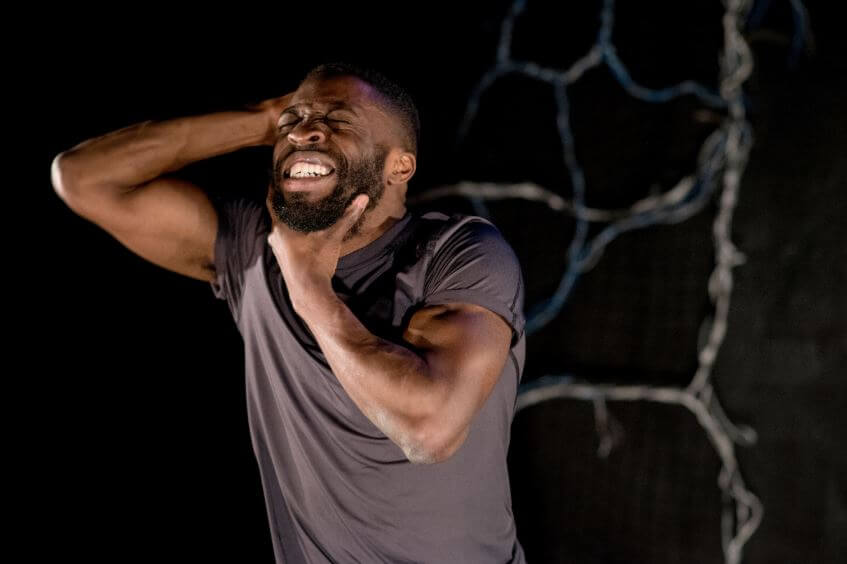
Photography by Camilla Greenwell
Something’s wrong. Can’t get out of bed, can’t concentrate, can’t shake the mounting tension. Something unspoken is building up, leaking out, taking over…
Fusing physical theatre, hip hop dance and spoken word, Elephant in The Room is an explosive solo that explores the mental health crisis and the phenomenon of toxic masculinity. This semi-autobiographical work, created and performed by Lanre Malaolu, takes a sharp sideways look at the insidious stigma around mental health issues, asking how race, class and culture can affect the way we choose to address them. And what happens when we don’t…
With live sound manipulation from Jan Brzezinski and dramaturgical support from Season Butler and Zoe Lafferty. We catch up with Director Lanre Malaolu to find out more.
What inspired you to create this work?
My experiences with mental health, friends’ experiences and the fact that conversations around black male mental health need kick starting in order to make a change.
You’ve described this piece as semi autobiographical. How important is it for you to draw from your own experiences when making work?
Generally my work stems from two places, my own personal experiences and/or an impulse to understand and know more about the world. With the former, I use myself and experiences as a focal point because I have a direct link to the emotions and “baggage” they bring, I can easily tap into that. But, even using my own experiences as a foundation, I always try to look at the bigger picture, the universal idea that it holds, in order for the work to connect to a range of people. Elephant in the Room focuses in on black male mental health as a starting point, but does so in a way where people of all backgrounds who experience mental health issues/ challenges full stop can hopefully connect with it, exploring the topic along with associated themes like toxic masculinity.
Does this work give you a sense of catharsis?
I’m in the thick of it at the moment, so can’t really answer this yet as I’m just in ‘go mode’! But, in general, I find that the true catharsis comes much later down the line after a project. This was the case with the film I made called FIGURE . It wasn’t until a good 6 months after making that film that I realised how much of a cathartic effect making it had on me.
Mental health is very topical at the moment. How does the black male perspective add to the conversation?
Firstly, and most importantly, the fact that it needs to be added into the conversation. In terms of how it adds to the conversation, I think it gives an insight to the nuances of being black and male — while experiencing mental health issues — its challenges and stigma. If you’re black and working class, you’re more likely to be diagnosed with mental health problems (and this is only if you look into taking the necessary steps to get help). Factors like poverty and racism come into this, but also elements like the mainstream mental health services failing to understand or provide services that are acceptable and/or accessible to non-white British communities. This needs to be addressed as there are so many young black men struggling.
How does this work differ from your other shows?
It’s a solo show that runs for an hour, which is a first for me. Oh, and it’s also the first time I’m working with live sound manipulation (with the G that is Jan Brzeziński)
How important is using hip hop theatre as a medium to address issues regarding toxic masculinity and mental health within the black community?
Hip-hop theatre is my most organic form of artistic expression. It comes from a deep, deep place, and I think to open that portal and make work from that place is already political. Hip-hop has an energy and an immediacy that you can’t ignore – it makes the experience potent and exciting. Playing with movement also allows me to bounce between humour and drama in a way that seems to really work with audiences.
What do you want your audience to take away from the show?
I hope they’ll find a starting point for conversation, an inner vibration and an impulse.
What they do with those things are up to them…
Catch Elephant In the Room all this week at the Camden People’s theatre.
Tickets available here: https://www.cptheatre.co.uk/production/elephant-in-the-room/
Valerie Ebuwa
Latest posts by Valerie Ebuwa (see all)
- REVIEW | THE POWER (OF) THE FRAGILE : A MOVING DANCE PERFORMANCE EXPLORING FRAGILITY, DREAMS, AND BOUNDARIES — July 5, 2023
- REVIEW | CELEBRATING 20 YEARS OF EXCELLENCE AT BREAKIN’ CONVENTION DAY 2 — May 9, 2023
- REVIEW | BREAKIN’ CONVENTION 2022…A MUCH NEEDED INJECTION OF ENERGY, POSITIVITY AND HOPE FOR THE FUTURE OF THEATRE — May 13, 2022
